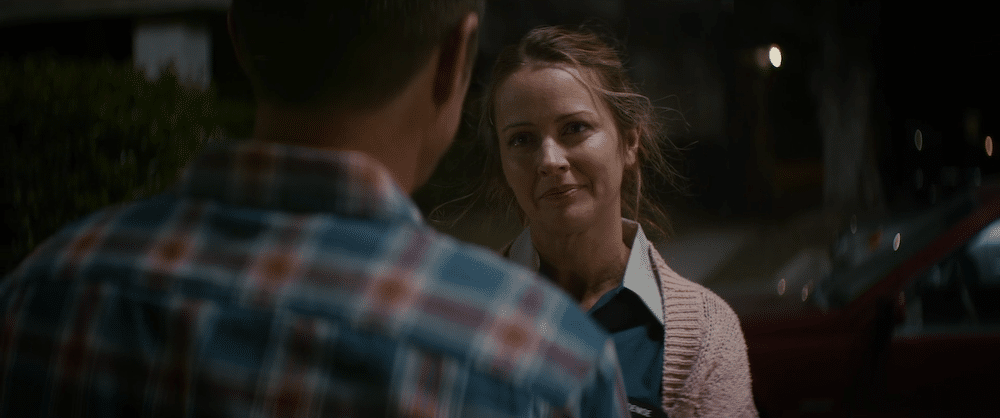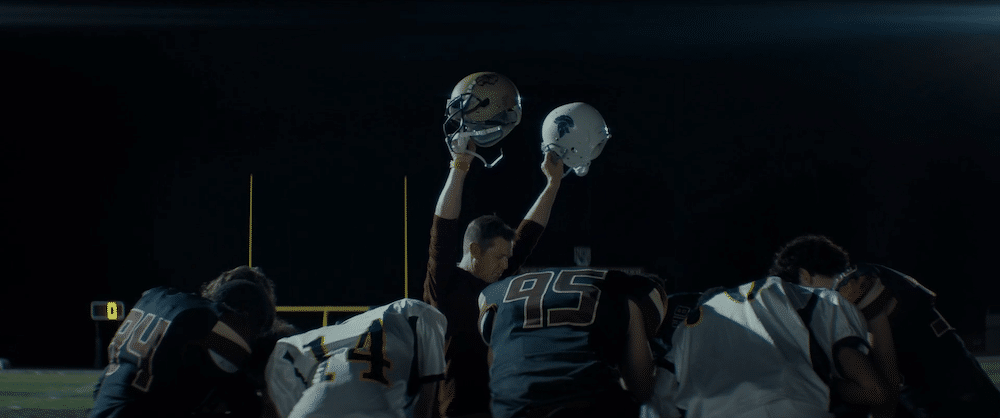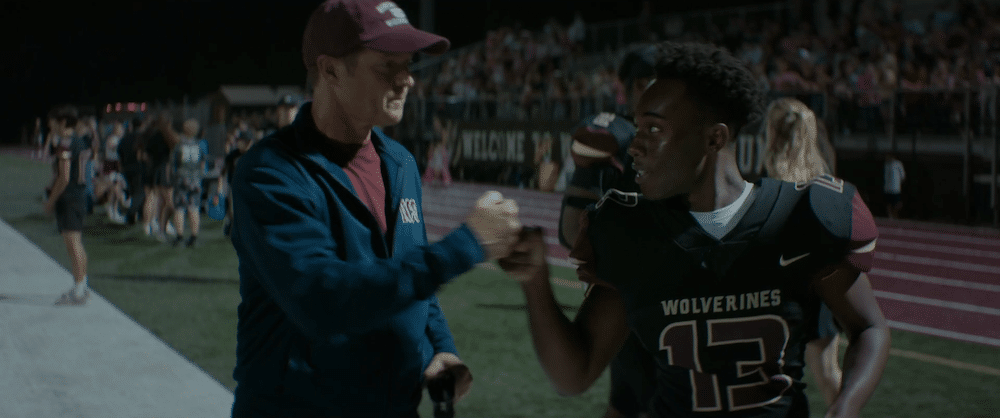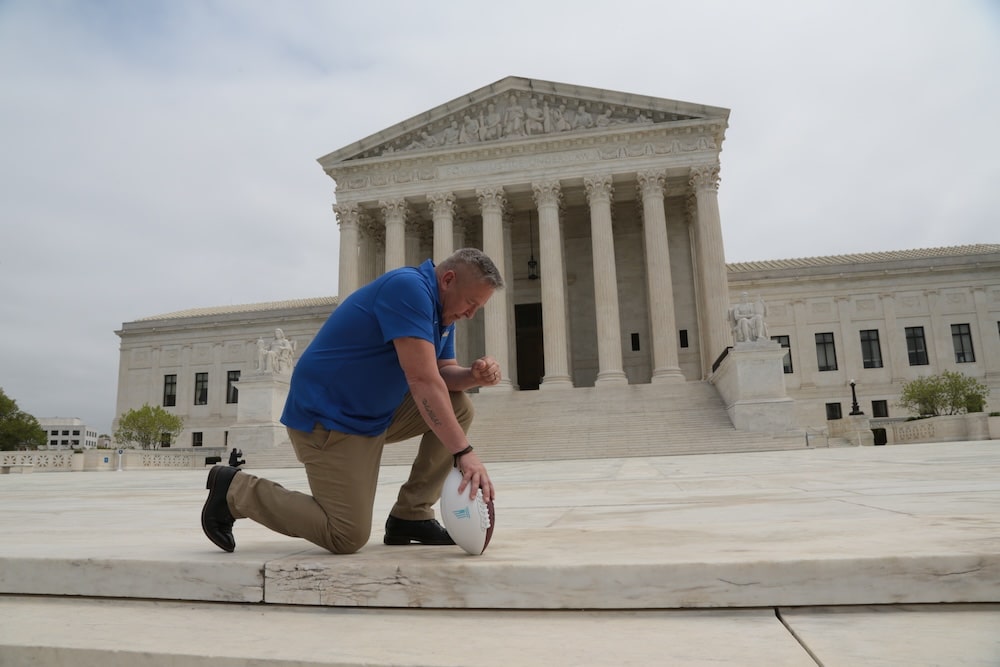An upcoming movie promises to tell the story of a former high school football coach whose First Amendment case concerning his right to pray on the field reached the U.S. Supreme Court.
“I really believe that God can do the most amazing things with the simplest of people,” Joe Kennedy told Our Sunday Visitor about the film that centers on his story. “I never understood why he picked me for this … but God had something to say, obviously.”
“Average Joe: The Unwavering True Story” hits theaters nationwide on Oct. 11. The film follows the life of Kennedy (played by Eric Close), a public school football coach in Bremerton, Washington, who lost his job after he refused to stop praying at the 50-yard line after games. The Supreme Court, in Kennedy v. Bremerton School District, ruled in favor of Kennedy, a Christian, in 2022. The nearly two hour-long film, rated PG-13, also tells the love story of Kennedy, and his wife, Denise (Amy Acker).
Both Kennedy and Robert Katz, producer of the film, spoke with Our Sunday Visitor about their own personal faith journeys and “Average Joe” ahead of its release.
“I think this really shows how the everyday person does make a difference and also the power of prayer, of what can happen when you have God centered in your life,” Kennedy said of his story.
He called the film “well above” 90% accurate to his real-life story, which includes a childhood in foster care and a career in the Marines. For even more details, he recommended his book with the same name.
“They had to summarize a lot of things,” he said of the filmmakers, “but wow, they nailed it so close that we feel honored and blessed.”
A love story
Katz, who has produced previous films such as “God’s Not Dead” and “The Blind,” called the movie a love story. He revealed that Kennedy met his wife and first proposed to her when they were nine years old. Kennedy’s legal battle, he said, tested the couple’s marriage.
“What he and Denise went through during those eight years, how it almost destroyed their marriage, and then, in the end, God used it to bring them closer than ever,” Katz described.
Kennedy said that the role of his wife in the film is his favorite part of the story. Even though they met as children, they both had prior marriages before they ended up together, he said.

“I fell in love with Denise, my wife, when we first met,” he revealed. “She was my first love and absolutely will be my last love … I think her story is 100 times better than mine, to see what she’s gone through in her life, and her faith.”
He credited her faith for bringing him back to God.
“I grew up in the Catholic Church and right after I started going into group homes and foster homes and boys’ homes, I just kind of threw all that behind me and started living for the world,” he said. “It took a woman of prayer and a person of faith to actually bring me to my knees, in front of the Lord, and give everything to him.”
Repeating a line his character says in the trailer, he said, “All of this really is, I think, her fault.”
“Because she is the one who finally married me,” he said. “She’s the one that was working at the school district and encouraged me to apply to be a coach.”

An American story
In addition to a love story, Katz also called the film a First Amendment story about freedom of speech and freedom of religion. For his part, Kennedy called it an American film.
“For me, this was never a religious fight, even though it had to do with my faith and saying a prayer on the 50-yard line,” he said. “It really had to do as an American right, I served in the Marine Corps for 20 years, and when I retired, I’m faced again with supporting and defending the Constitution.”
“I don’t see this as just a faith or a political thing,” he said. “I think this is an everyday American thing.”

A conversion through St. Faustina
Katz, who recently converted to Catholicism, also spoke about his own faith.
“I’ve only been a Catholic for about four years and I would consider myself one of the least likely people to be Catholics,” he said. “But it was one of those lightning encounters with St. Faustina that just grabbed me.”
Born and raised Jewish, he became a non-denominational, evangelical Christian in his 20s, he said.
Then, around 40 years later, he was driving down the street when he realized something was still missing, he said. He remembered crying out.
“I said, ‘God, after all these years, I don’t trust you. I still don’t trust you,'” he recalled. “And I started crying.”
At the time, he was listening to Joel Osteen on SiriusXM and noticed the Catholic Channel next to it. He switched to it, only to hear about the life of St. Faustina, a 20th century Polish nun who experienced visions of Christ.
That led Katz to read her diary.
“I turned to the picture, the Divine Mercy picture, and what’s across the bottom of it but ‘Jesus, I trust in you,'” he said of the famous image of Christ painted under St. Faustina’s direction. “And I’d just gotten through a little earlier telling Jesus, ‘I don’t trust you.'”
“It just broke me,” he said. “By the time I finished reading that book — it’s a big, thick book — I was Catholic.”

A call to action
Going back to the film, Kennedy hoped that viewers would take away two messages from it: The power of a praying wife and faith and that every single American can make a difference.
“This should inspire every American to just stand up and walk out of the theater thinking that they should take on the world,” he concluded, “and they want to stand up for their faith and for this country.”








